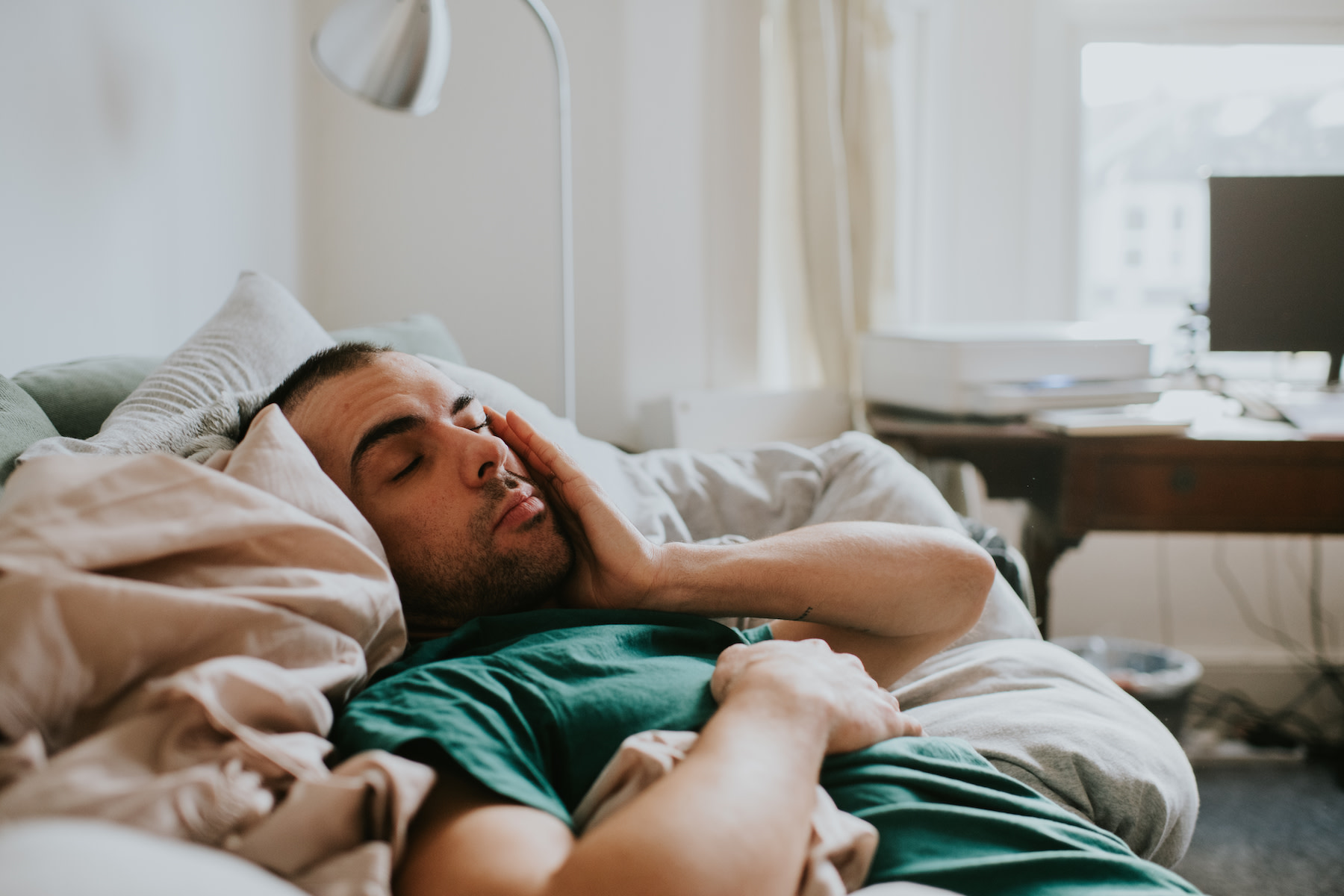
Catherine Falls Commercial / Moment via Getty Images
Always Feel Tired During Your Monday Workouts? ‘Social Jet Lag’ Might Be Why
Sleep experts explain how this common phenomenon impacts your fitness goals and general well-being.
By Michele Ross•
What Is Social Jet Lag?
How Social Jet Lag Impacts Exercise and Health
How to Recover from Social Jet Lag
How to Avoid Social Jet Lag in the Future
I’ve always reveled in staying up past my bedtime, followed by the coziness and comfort of sleeping in late. As a kid, that entailed snoozing my alarm clock on weekends and holiday breaks… which has pretty much remained the same well into adulthood. However, it turns out that this long-standing habit—known as social jet lag—could have some unfavorable effects on everything from fitness performance and sleep quality to metabolic health and overall well-being.
Discover more ways to reach your goals with Peloton
Keep reading to learn more about what social jet lag is, how it impacts our bodies, and how to avoid it in the future, according to sleep experts.
What Is Social Jet Lag?
In short, social jet lag occurs when we shift our sleep-wake times to accommodate our social (vs. academic or professional) lives. This most often involves hopping into bed later than usual on Friday and Saturday nights and waking up later on Saturday and Sunday mornings… only to have the repercussions hit when we struggle to fall asleep on Sunday evenings and deal with a gnarly domino effect from Monday forward. It’s like your body has changed time zones—minus the cross-country flight.
According to a 2023 article published in the journal Nature Reviews Endocrinology, we live with three clocks:
The social clock as described above
The biological clock in line with our circadian rhythms (innate sleep-wake preferences)
The sun clock that indicates daylight and nighttime
The article notes that social jet lag is the quantifiable difference between the first two clocks, social and biological. However, the more misaligned all three are, the greater the risks for our health.
Why Is Social Jet Lag So Common?
Not everyone is the proverbial early bird who delights in waking up early 365 days a year. Some people (myself included) are night owls who are predisposed to feeling tired only after most people have already drifted off into dreamland. At the same time, we night owls still want to log a full eight hours of sleep, which might mean sleeping past standard breakfast times when schedules allow. It might seem unsurprising, then, that night owls are more susceptible to experiencing social jet lag—and struggling with sleep issues overall—since their internal clocks don’t follow the standard 9-to-5 workweek timeframe.
“It is very hard for people with late chronotypes (i.e., natural night owls) to avoid social jet lag,” says Jade Wu, PhD, a clinical psychologist, board-certified behavioral sleep medicine specialist, and author of Hello Sleep: The Science and Art of Overcoming Insomnia Without Medications. “Since their bodies are constantly trying to go to sleep and wake up later, they're always fighting against their bodies’ natural chronotype.” Night owls are most likely to revert to their preferred sleep schedules when the opportunity strikes, but will often take a hit to adjust back to their “real-world” norm.
The general cohort of night owls aside, age and sex may also impact how susceptible you are to social jet lag. Female Millennials and Gen Z-ers report experiencing the phenomenon more often than other demographics, according to behavioral sleep specialist Carleara Weiss, PhD.
How Social Jet Lag Impacts Exercise and Health
You might think that going to bed late (followed by sleeping in late) on weekends is innocuous enough—but it could have wide-reaching effects on your fitness goals and overall well-being.
Social Jet Lag’s Effect on Health
According to Weiss, short-term effects of social jet lag include:
Mood swings
Irritability
Poor attention span
Adverse shifts in eating patterns
Reduced physical activity
Issues falling asleep
“Social jet lag disrupts your circadian system: the network of biological clocks that run everything in your body and brain, including sleep, metabolism, hormone secretion, and more,” Wu explains. “When this system is confused by unpredictable rhythms (e.g., social jet lag), it's not able to do any of its functions as well.”
She says this could lead to long-term adverse effects, including but not limited to:
Less efficient energy use
Poorer blood sugar regulation
Higher systolic blood pressure
Increased risk of weight gain
Moreover, a 2023 study published in the European Journal of Nutrition shows that social jet lag is linked to imbalances in the gut microbiome, poorer diet quality, and elevated markers of inflammation. Additional research also shows that these shifts are associated with an increased likelihood of smoking and alcohol use, as well as experiencing depressive symptoms.
Over time, social jet lag can really take a toll on your wellness game—even if you do nearly everything else to a T (or close to it). “Having social jet lag means getting less benefit out of those other healthy behaviors,” Wu notes.
Social Jet Lag’s Effect on Exercise
Based on the insights from the sleep experts above, it’s not too surprising that the ramifications of social jet lag can trickle into your exercise regimen. (Case in point: sluggish Monday workouts.) “Social jet lag and disrupted circadian functioning don't just impact your performance on Mondays, even if that's when it feels the worst,” Wu says. “It can increase your overall inflammation and injury risk, as well as decrease your strength and cardiovascular potential.”
For instance, she cites a 2022 study published in the International Journal of Environmental Research and Public Health investigating chronotypes and social jet lag in Reserve Officers' Training Corps (ROTC) cadets. Participants with evening chronotypes and/or social jet lag performed worse during their morning Army Physical Fitness Tests. What’s more, those with social jet lag were more likely to get injured at some point during their 14-week training period.
It turns out that standard jet lag is also shown to affect elite athletes at game time. “For example, when NBA teams travel eastward for away games (i.e., they experience regular jet lag and get less sleep or have to get up earlier than their bodies are used to), they score fewer points, get fewer rebounds, and win less often compared to traveling westward for away games,” Wu shares.
It’s safe to say that most of us are neither professional athletes nor preparing for the line of duty. But if jet lag (the social or standard type) can wreak havoc on such individuals whose livelihoods depend on maintaining peak physical condition, it goes to show that it can affect us all.

Maskot / Maskot via Getty Images
How to Recover from Social Jet Lag
“Once you experience social jet lag, the ‘damage’ is already done,” Wu warns. “No recovery method will undo it.” As such, she suggests avoiding it in the first place. (Stay tuned for tips on how to do so in the section below.)
But of course, life happens. It’s unlikely that you’ll never experience social jet lag again, especially if you’re prone to the phenomenon on a regular basis. That said, if you’re experiencing social jet lag, aren’t feeling too out of sorts, and are planning to work out that day anyway, Weiss advises breaking a sweat sooner rather than later.
“Exercise works as a zeitgeber (a time giver), helping our biological clock readjust to the time of the day and telling our brain to reorganize bodily functions such as metabolism, hormone secretion, and sleep,” she explains. “Exercising earlier in the day helps the biological clock move to an early shift (to go to bed and wake up earlier), while late exercise delays the biological clock (to sleep and wake up later).”

Peloton App
Access thousands of classes with no equipment needed.
In addition to exercising as early as possible, you can inch towards social jet lag recovery by staving off the urge to nap. Although a short snooze could help you feel better straight away, chances are it’ll mess with your ability to sleep later that night, thus doubling down on the issue.
How to Avoid Social Jet Lag in the Future
Going to bed and waking at the same time each and every day—on weekends, holidays, and vacations alike—is the gold standard for optimizing sleep quality and avoiding social jet lag. But don’t sweat the exactitude too much, as Wu notes that there’s some wiggle room to play with.
“A little bit of circadian disruption is OK,” she says. “Generally, we recommend keeping your rise time in the morning to within about one hour.” This could look like waking at 7 AM on work days and 8 AM on days off, for instance.
Weekends aside, holiday breaks, getaways across time zones, and festive parties can also contribute to social (or standard) jet lag. Fortunately, these irregular deviations from your norm shouldn’t be too much cause for concern, either. "I wouldn't sweat it for [these occasions]; just do what you want to do and enjoy your ‘cheat days’ of social jet lag if that allows you to spend time with family and friends,” Wu says. “But getting up and going to bed around the same time for the most part is important.”
It can be easier said than done to abide by a consistent sleep schedule—even more so if you have a late chronotype and need to shake off your social jet lag habit. Fortunately, the sleep experts we spoke with offer four parting tips that can help you forge healthier sleep habits, and thus, advance your fitness and wellness goals across the board:
Close to bedtime, help your body get into “Do Not Disturb” mode by setting an ambient mood. “Avoid too much light exposure at night by dimming lights and screens,” Wu suggests.
Get some sunlight for at least 30 minutes upon waking up. “Light exposure helps synchronize the biological clock and maintain a healthy rhythm,” Weiss explains.
Consider exercising in the morning to further help your circadian rhythms adjust to an earlier schedule.
Last but not least, be mindful not only of what, but also when, you eat. Weiss says that keeping consistent meal times can preserve hormone regulation (including melatonin, the famed sleep hormone) and metabolism.
This content is for informational and educational purposes only and does not constitute individualized advice. It is not intended to replace professional medical evaluation, diagnosis, or treatment. Seek the advice of your physician for questions you may have regarding your health or a medical condition. If you are having a medical emergency, call your physician or 911 immediately.
This content is for informational and educational purposes only and does not constitute individualized advice. It is not intended to replace professional medical evaluation, diagnosis, or treatment. Seek the advice of your physician for questions you may have regarding your health or a medical condition. If you are having a medical emergency, call your physician or 911 immediately.
Level up your inbox.
Subscribe for a weekly dose of fitness, plus the latest promos, launches, and events.
By providing your email address, you agree to receive marketing communications from Peloton.
For more about how we use your information, see our Privacy Policy.








